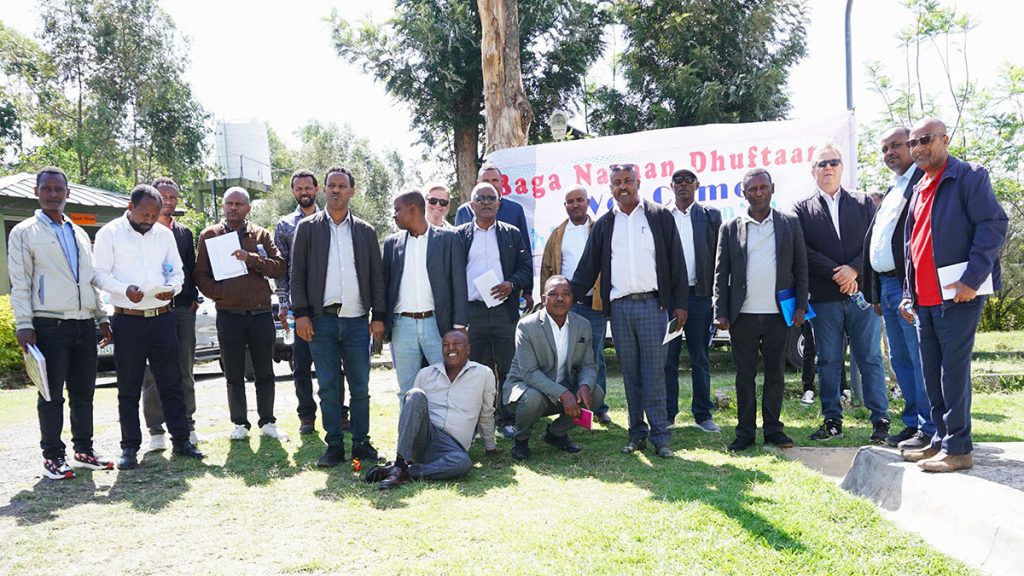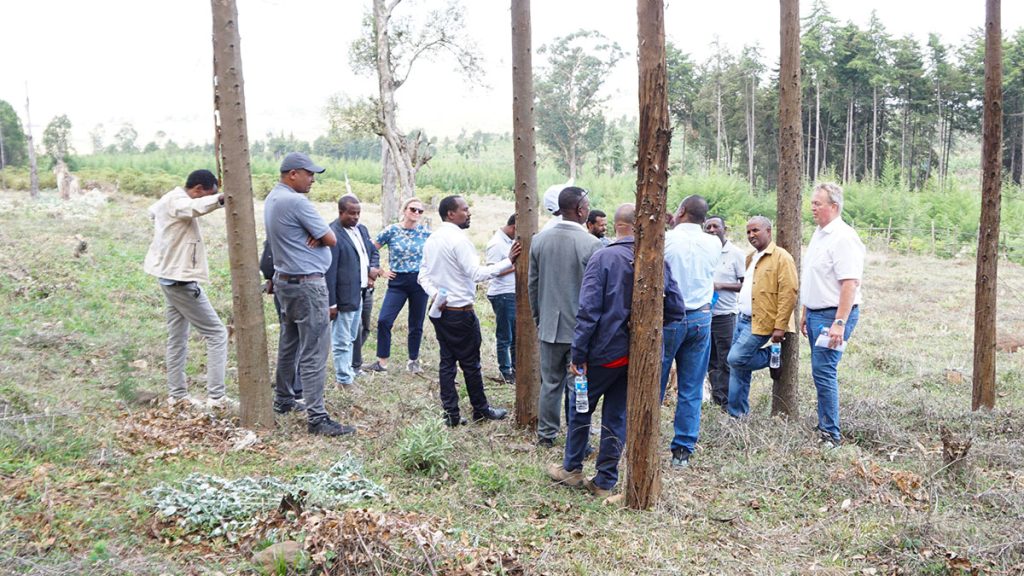
By Eyob Getahun
The Provision of Adequate Tree Seed Portfolios (PATSPO) project has made significant progress in Ethiopia over the past year in helping stakeholders produce, collect and use quality seed as the country continues its ambitious land restoration programme.
This was highlighted during the fifth biannual meeting of the PATSPO II Steering Committee overseeing the second phase of the project, which was held on 23 April 2025 in Addis Ababa.
As part of their tradition, the committee members visited activities of Oromia Forest and Wildlife Enterprise (OFWE). Their first stop was the Dima Tree Seed Centre (DTSC) in Sebeta, Oromia Region, followed by a visit to the breeding and seedling seed orchards (BSOs and SSOs) in Suba Forest.
At DTSC, Deputy Director of the Ethiopian Forestry Development (EFD), Dr. Motuma Tolera, along with other committee members, was warmly received by the centre’s staff and Deputy Director General Kedir Nino of OFWE.
With the help of the PATSPO II project’s capacity-building efforts and funding, the DTSC staff have provided training in seed collection and handling to 1,497 farmers, according to Lemma Kitila, who heads the centre.
In the most recent Ethiopian fiscal year, a total of 533 farmers – 320 male and 213 female – collected seed for the centre and were paid almost ETB 11.2 million (about USD 83,700), Lemma said in a presentation at the meeting.
The project has also procured laboratory tools and equipment for the DTSC, while providing useful posters, publications and training material that the staff use at the centre.
The Steering Committee members visited the centre’s seed laboratory, the seed processing area and the seed storerooms (both ambient temperature and cooled). They were informed that the DTSC has been collecting more and more seed of indigenous trees over the past few years. The OFWE ascribes the increase in demand for indigenous tree seeds to the Green Legacy Initiative, a programme initiated by Ethiopian Prime Minister Abiy Ahmed in June 2019 with a target of planting 20 billion seedlings within four years.


After heading to Suba Forest, the Steering Committee members then visited the BSOs/SSOs established there by PATSPO in collaboration with OFWE. They visited five of the seven BSOs established at Suba, including those of Juniperus procera, Cupressus lusitanica, Hagenia abyssinica, Acacia abyssinica and Eucalyptus globulus.
Abrham Abiyu, previously a senior PATSPO officer who now works for another CIFOR-ICRAF project in Uganda, explained to them that the Eucalyptus globulus BSO – which was established in 2020 – has already been thinned twice with the support of EFD researchers.
He underscored the need for further thinning and continuous follow-up and management of all the BSOs established by the PATSPO project. Thinning is the removal of plants, or parts of plants, to make room for the growth of others.
Sebsebe Demissew, a professor of plant systematics and biodiversity at Addis Ababa University, told the visitors that the undergrowth in the thinned Eucalyptus globulus BSO is good despite the widely accepted belief that eucalyptus generally inhibits the growth of other vegetation under its canopy.
“Proper management is what matters,” he said. “People tend to plant eucalyptus close to one another. That is why there is no undergrowth in such woodlots.” The PATSPO project has so far established 13 BSOs and nine SSOs in Oromia Region.

In the afternoon, the Steering Committee members received updates on the project’s performance and listened to presentations from its partners.
Soren Moestrup, a senior team leader of PATSPO II, told the participants that the project signed agreements with major partners in 2025. Unfortunately, Amhara Forest Enterprise (AFE) was not among them as the project’s activities in Amhara have been disrupted due to unrest in the region. However, Moestrup said 13 out of 20 BSOs and SSOs in Amhara Region are in good condition, while four are in fair condition; the remaining three are in poor or bad condition.
The meeting’s participants also discussed the new modality for implementation of partner agreements, including instalments and reporting.
PATSPO II will end in December 2025. The final review will be conducted in October, when the Steering Committee is also scheduled to have its next meeting.The PATSPO II project is financed by the Norwegian International Climate and Forest Initiative through the Royal Norwegian Embassy in Ethiopia. It is a four-year project that began in April 2022 and aims to build on the achievements of the first phase through the development of more breeding seed orchards and registered seed stands, as well as the training of regional tree seed centres, private seed dealers, and farmer groups collecting tree seed. CIFOR-ICRAF is responsible for the implementation of the project, in coordination with the Ethiopian Forestry Development (EFD), the Norwegian International Climate and Forest Initiative (NICFI) and the Royal Norwegian Embassy in Ethiopia.













